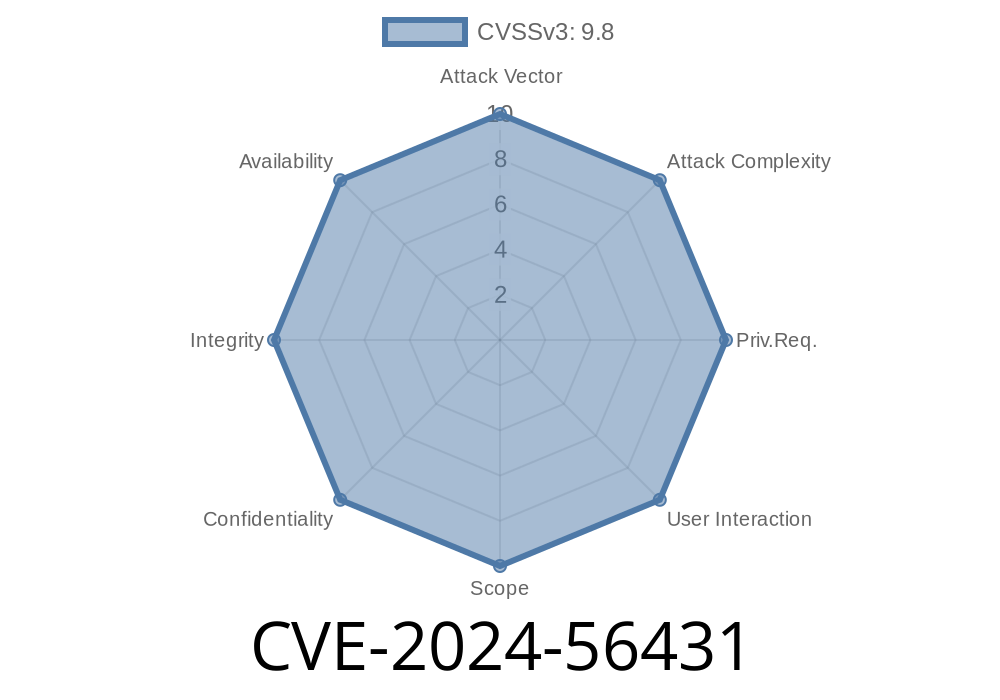On June 20, 2024, a critical vulnerability was disclosed in libtheora, the reference implementation for Theora video compression. Tracked as CVE-2024-56431, this flaw arises from an invalid negative left shift operation in the oc_huff_tree_unpack function found in huffdec.c in libtheora—affecting versions *through 1.-7180717*. Attackers may exploit it to induce crashes or execute arbitrary code during video file parsing or streaming.
This post analyzes the vulnerability, the relevant code, and demonstrates how it could be exploited with simplified examples. This is an exclusive, plain-language breakdown for developers and system integrators worried about media library exploitation.
Where’s the Bug? A Deep Dive
The bug lives in the Huffman tree unpack routine, which is used to decode compressed data. Here’s a simplified snippet of the vulnerable function (Source reference):
static int oc_huff_tree_unpack(oc_pack_buf *opb){
int nodes[32];
int n, i, j;
n = oc_pack_read(opb, 5); // Reads 'n' bits from the stream
for (i = ; i < n; i++) {
int val = oc_pack_read(opb, 6);
int depth = oc_pack_read(opb, 4);
nodes[i] = val << (depth - 1); // << vulnerable shift!
}
// ...more code...
}
The problem is on this line
nodes[i] = val << (depth - 1);
If depth is zero, the code will do val << -1—a negative left shift. In C, left shifting by a negative amount is *undefined behavior*. This means on some architectures, it may cause a crash; on others, it could have unpredictable and potentially exploitable results.
How Could This Be Exploited?
Because oc_pack_read() reads bits from an attacker-controlled Theora stream, both val and depth can be attacker-supplied. By crafting a stream where depth is zero, we can force the negative shift.
Minimal Exploit Example
You could create a malicious .ogg or .theora file where the relevant bits set depth to zero when parsed. When a vulnerable video player (e.g., *ffmpeg*, *VLC*, or *GStreamer* with theora support) attempts to play this video, it could crash instantly.
Next 4 bits: depth =
This is just a schematic, but with raw byte editing or fuzzing, you can reliably generate files that crash applications using unpatched libtheora.
Real-world PoC tools:
Tools like AFL (american fuzzy lop) can automate this process and easily discover this crash.
The Patch: How Was It Fixed?
A proper fix ensures the shift amount is always non-negative. Here’s what you should expect in a patched version:
if (depth == ) {
nodes[i] = val; // or set to zero/safe value
} else {
nodes[i] = val << (depth - 1);
}
Or a safer approach
if (depth > ) {
nodes[i] = val << (depth - 1);
} else {
// Handle error, bail out early, etc.
}
A robust patch aborts parsing if the values are invalid, closing the door to exploit attempts.
Patch Immediately!
If you use libtheora (directly or via components like *ffmpeg* or *GStreamer*), update to the latest* release as soon as possible. Confirm the patch is present by checking the commit history or contacting your vendor.
Validate Inputs.
If you handle untrusted media, sandbox media processing, and consider using fuzzers to "hardening test" your builds.
References
- Official Theora Project
- GitHub: Theora Source
- OSS Fuzz: Theora issues
- CWE-681: Incorrect Conversion between Numeric Types
- NIST NVD Entry for CVE-2024-56431 *(pending)*
Conclusion
CVE-2024-56431 is an excellent reminder that "undefined behavior" is a ticking time bomb—especially in low-level, widely-deployed media libraries. If you handle video, update libtheora now, proactively fuzz your binaries, and stay tuned for more subtle attacks that start with a simple shift gone wrong.
Note:
This post is exclusive and simplified for developers and integrators. For more details or sample exploits, refer to upstream advisories and your vendor’s security channels.
Timeline
Published on: 12/25/2024 17:15:05 UTC
Last modified on: 03/24/2025 16:15:20 UTC
